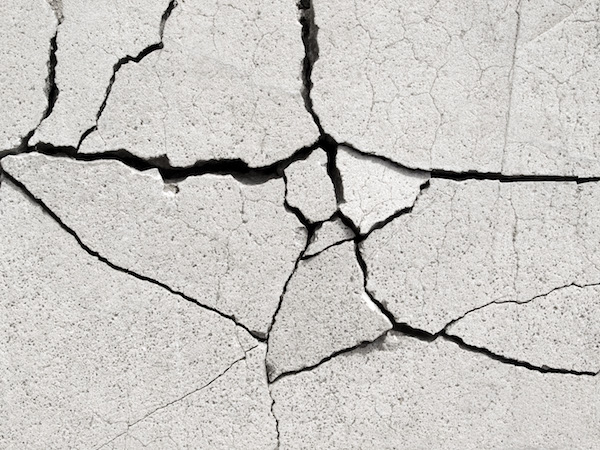When installed properly, concrete is one of the most durable and long-lasting products you can use around your place of business or your home. It’s important to note that we follow well-established guidelines with respect to concrete placement. Durable, high strength, and crack resistant concrete slabs or driveways don’t happen by accident.
Still, concrete is subject to cracking, and as a property owner, you may wonder why it happens. Here’s six reasons concrete cracks.
Excess water in the mix:
Concrete does not require much water to achieve maximum strength. However, a wide variety of concrete used in commercial or residential work has an excess of water in it. The soupier the concrete mix, the greater the shrinkage. Concrete can shrink as much as ½ inch per 100 feet. This type of shrinkage causes forcesin the concrete which literally pull the slab apart, and cracking is the end result.
Rapid drying of the concrete:
If your newly poured concrete dries too quickly, the risk of cracking increases significantly. The chemical reaction, which causes concrete to go from the liquid or plastic state to a solid state, requires water. This chemical reaction, or hydration, continues to occur for days and weeks after you pour the concrete.
Lack of control joints:
Control joints help the concrete crack where we want it to. We ensure the joints are of the depth of the slab and no more than 2-3 times (in feet) the thickness of the concrete (in inches). For example: 4” concrete should have joints 8-12’ apart.
Never pour on frozen ground:
We never pour concrete on frozen ground. Since the subgrade must be prepared according to the soil conditions, pouring on frozen ground is one way to ensure problems will happen. In Toledo, Ohio, frozen ground is inevitable. The season can be short, or it can be long.
Load limits:
Concrete is designed to take a certain load. Most sidewalks and residential driveways are designed to take the weight of a car or small truck. However, if the job we are doing is in an industrial setting, then the load limit is much higher, and the slab we pour will be engineered to take your heaviest load.
Settlement cracks:
A settlement crack occurs when the ground under the concrete shifts. This could be the result of poorly compacted soil, the wrong kind of soil, water erosion, or tree roots. While we cannot predict what tree roots will do, we will ensure that the soil is compacted properly, that we’ve investigated and know the composition of your soil and pour accordingly.
Ensuring your concrete is resistant to cracking is fundamentally important for many reasons. In a previous article, ‘Five Hazards of Cracked Concrete’, we pointed out what can go wrong and why you want to ensure cracking is kept to a minimum.
Our commitment to quality takes all conditions into consideration prior to pouring your concrete. Load limits, proper water ratio, andcontrol joints – all of these problems can be avoided when you choose to work with E & K Contractors on your next project. Give us a call, and we will send our professionals out to assess your job and provide you with an accurate estimate.

